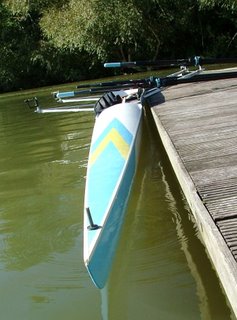
A few weeks ago, when I first met Tom and Nick from the Hinksey Sculling School, they warned me that sculling is addictive. They warned me that it was a hard thing to just try once and then cast aside. I’d be drawn to it, they said. I ought to be careful, they said. From the outside looking in, I admired their love of their sport, but I didn’t believe a word of it.
To me rowing (and sculling) was all about power. The bigger man wins. Yes, there is technique involved, but if you’ve trained harder and lifted more weights, you can make up for deficiencies in technique in a way that a technically gifted lightweight could never counteract.
On Saturday, for the first time, I got into a proper boat and headed out on the river. It didn’t take long before I realised how wrong my preconception about power was, and how right Tom and Nick were about the addictiveness of the sport.
The boat (pictured above) was a double scull. As I climbed down into it I felt the same disconcerting wobble of boat-on-water that I had previously felt climbing into a racing kayak in Nottingham last April.
Nick sat behind me in the front of the boat (if you can figure that out) and we pushed off. He explained how to keep the boat stable - hands in front, like Marcel Marceau climbing a ladder that isn’t there, left hand slightly above right - and demonstrated how the slightest lifting of either hand would make the boat tip to the opposite side.
Having established how not to fall in, and run through some light jargon (every sport has its own little language, littered with shibboleths to distinguish those in the know from those in the dark), we set off up the river.
I say we set off – really, Nick set off as I balanced the boat with my newfound blade (not oar) skills. A short dash down the river later, Nick decided he’d had enough of doing the hard bit and started talking me through how to scull.
What I did was very basic. The seat is on runners, but my legs were to remain locked straight throughout our session. At first, I wasn’t even moving from my hips, just using my arms, and the notion of flattening the blades on the way back wasn’t even entertained. Despite all that, there was a definite thrill involved in being the one powering the boat.
I learnt both my lessons (about power and addiction) almost simultaneously. I quickly realised that all the power in the world (and therefore, a lot of the time I’ve spent recently on the rowing machine or lifting weights) is entirely useless if you don’t know how to apply it. And I clearly didn’t have a clue.
Then, as I felt around with my blades, and splashed, and dug too deep, or missed the water altogether, suddenly, from nowhere, a perfect stroke. Both blades entered the water at the same time, dug just deep enough to get the maximum pull, without digging too deep and causing the boat to lean to one side, and then both blades exited the water together and ripped back, half an inch off the surface, ready to do it all again.
And I was hooked.
Most of my sporting understanding is filtered through golf. The same phenomenon exists there. A complete novice can lift a golf club, waft it around a bit, and if he or she is very unlucky, catch one absolutely flush and be addicted for life. The essence of the addiction is frustration. A glimpse of perfection is granted, but only for long enough to make you feel the need to search for it forever.
Rowing is a sport, like golf, where repetition is key. Above a certain level the difference between one person’s best and another person’s best is irrelevant. Instead, it becomes about who can reproduce their best most frequently, and (crucially) reproduce their best when it really matters.
Redgrave may not have been technically the best rower - or indeed the strongest, or the fittest - but he had in spades what others lacked. He had the ability to deliver his best at the critical moment.
It is the fact that you can sit in a boat for the very first time and produce (entirely by accident of course) something close to a Redgrave stroke that makes rowing addictive. I can watch Zidane with a football at his feet and admire the beauty of it, but can never know how it feels to do what he’s doing. I can watch Federer hit shots on a tennis court that make the hairs on the back of my neck stand on end, but I can only admire it, never experience it.
It goes without saying that I could never attain the Olympic heights scaled by Sir Steve, but at least I can taste it, just for a moment. I can’t decide yet if that taster is a wonderful thing or the dangerous early stages of a crippling addiction. This challenge is going to be hard enough to complete without having to spend time in rehab.
"You're gonna need a bigger boat..."
Tuesday, October 10, 2006
Posted by John McClure at 10:58 am
Subscribe to:
Post Comments (Atom)
1 comments:
I could think of a lot worse things to be addicted to than rowing! It's when you're out there at 7am on a cold Sunday morning that you really need to worry! Katie
Post a Comment